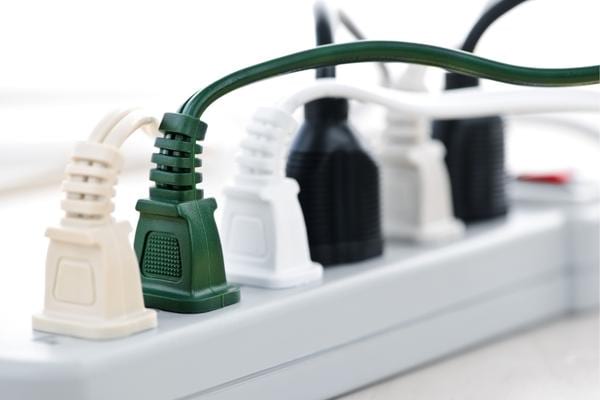
When we think of the past, one of the first thoughts that runs through our mind is how people lived without electricity. Nowadays, we can’t even imagine a day without it because all of our appliances and devices run on electricity.
The truth is, however, that most homes don’t have enough power outlets to keep everything running and charged, so most of us rely on power strips without being aware that appliances that consume a lot of energy become dangerous fire hazards when we plug them into a power strip.
Although power strips are the thing to go to when it comes to charging your phone or power an entertainment setup, there are certain devices that should never be plugged into a power strip.
Air conditioners, space heaters, toasters, and other appliances that use high wattage can easily cause power strips to overheat, which can easily lead to a fire hazard.

Even before plugging anything into a power strip consider the ammount of power they support. This is usually listed on the product itself.
High-capacity appliances need to draw a lot of power through an electrical circuit to work. Keep in mind that an appliance does not need to be large in size to draw large amounts of power.
Below is the list of appliances that should never be plugged into a power strip.
1. The oven: Even though the oven is not used continually, it is a power-hungry appliance that should not be plugged into a power strip. In fact, it should be plugged into its own wall outlet on its own circuit.
2. Refrigerator: Refrigerators require a lot of power and frequently cycle on and off which can easily overload a power strip and cause damage. Much like the oven, refrigerators require a wall outlet dedicated solely to powering the appliance.

3. Washing Machine: When turned on, washing machines pull a lot of power. This is the main reason why these appliances shouldn’t share a receptacle with any other appliance or device.
Most washing machines use a max of up to 1400 watts, putting it dangerously close to the max load of most power strips. On top of that while working, washing machines are usually left unattended and work longer hours, at least an hour, which is long enough for a power strip to overheat.
4. Heating: Portable heaters should never be plugged into a power strip because most of them use 1,500 watts of energy on their high setting and they usually run for extended periods of time.

5. Microwave: Since they consume a lot of energy when used, most microwave ovens are plugged into their own receptacle and that is always a good practice.
6. Coffee Maker: Those who own a coffee maker are not fully aware of the power these appliances use, and this is why they should never be plugged into any sort of power strip or extension cord.

7. Toaster: You may think that browning up slices of bread or bagels doesn’t require a lot of energy, but the truth is that toasters use a lot of energy when in use and they should be plugged directly into the receptacle rather than a power strip.
8. Another Power Strip: Power strips are not meant to be used in conjunction with another power strip, although many people do exactly that. This, however, violates most safety codes because it can easily lead to overloading the electrical system.
9. Electronics (Computer, TV, Router): These types of electronic devices don’t necessarily use a lot of power on their own, but they are sensitive to surges and you can find yourself with a burnt out computer or TV very quickly if you plug them into a power strip.
If you want to protect these sensitive devices from power surges, opt for a power strip that functions as a surge protector.
Meu filho de 5 anos se opôs ao meu casamento – o motivo dele deixou todo mundo pálido

Diana se sente feliz e nervosa enquanto se prepara para se casar com Tom. Mas a objeção de seu filho de cinco anos surpreende a todos e interrompe a cerimônia. Enquanto os convidados murmuram em choque, Ethan revela um segredo que faz todos ficarem pálidos. O que Ethan sabe sobre Tom que pode mudar tudo?
Fiquei na pequena casa ao lado do jardim, cercada por minhas damas de honra.

Uma madrinha colocando uma faixa na cabeça da noiva | Fonte: Pexels
Era a manhã do meu casamento e eu estava animada e nervosa ao mesmo tempo.
O chalé tinha um cheiro doce de flores e, pelas janelas, eu podia ver os convidados chegando e se sentando.

Backshot de uma noiva em um vestido de noiva | Fonte: Unsplash
Minhas damas de honra, em vestidos suaves de tom lavanda, se movimentavam ao meu redor, arrumando meu cabelo e ajustando meu vestido.
Eles conversaram e riram, e sua alegria contagiou-me.
Sorri, pensando na jornada que me trouxe até aqui.

Uma madrinha ajudando a noiva | Fonte: Unsplash
Tom e eu estávamos juntos há três anos. Ele entrou na minha vida quando eu mais precisava dele, e ele era tudo o que eu esperava de um parceiro.
Mais importante ainda, ele foi uma figura paterna maravilhosa para Ethan, meu filho de cinco anos.

Um pai e um filho | Fonte: Pexels
O vínculo que Ethan e Tom compartilhavam era algo especial. Eles passavam horas brincando com carrinhos de brinquedo, construindo castelos de Lego ou fazendo pequenas aventuras no parque.
Vê-los juntos encheu meu coração de felicidade.
“Mamãe, olhe para mim!” A voz de Ethan me trouxe de volta ao presente.

Um garotinho de terno | Fonte: Midjourney
Virei-me para vê-lo parado orgulhosamente em seu terno minúsculo, seus olhos azuis brilhando de excitação. Ele parecia tão crescido e bonito, que quase trouxe lágrimas aos meus olhos.
“Você parece tão inteligente, Ethan”, eu disse, ajoelhando-me ao seu nível. “Você está pronto para me ajudar hoje?”

Uma noiva conversando com uma criança | Fonte: Midjourney
“Sim, mamãe!” ele exclamou, sorrindo. “Eu vou ser o melhor portador de alianças de todos os tempos!”
Abracei-o com força, sentindo uma onda de amor e gratidão.
Este dia não foi só sobre Tom e eu; foi sobre nossa pequena família e o futuro que estávamos construindo juntos.

Uma noiva feliz e um menino sorridente | Fonte: Midjourney
A porta do chalé se abriu e uma das minhas madrinhas, Kelly, espiou. “Diana, está quase na hora. Você está pronta?”
Respirei fundo e assenti. “Sim, estou pronto.”
Quando saímos da casa de campo e entramos no jardim, a visão me deixou sem fôlego.

Uma noiva e sua dama de honra | Fonte: Unsplash
O corredor estava repleto de flores, criando um lindo caminho até o altar onde Tom estava esperando por nós.
Todos os convidados estavam sorrindo e conversando alegremente.
Foi o cenário perfeito para o nosso dia especial.

Um noivo sorridente | Fonte: Midjourney
“Ethan, você está pronto?”, sussurrei para meu filho, apertando sua mãozinha.
“Pronta, mamãe”, ele respondeu, com os olhos brilhando de excitação.
Caminhamos pelo corredor, com uma música suave tocando ao fundo.

Uma noiva caminhando pelo corredor com um garotinho | Fonte: Midjourney
Eu podia sentir os olhos dos nossos convidados em nós, seus sorrisos calorosos aumentando a alegria do momento. Ethan parecia tão adorável em seu terno, e seus passos eram confiantes e orgulhosos enquanto ele segurava minha mão.
Conforme nos aproximávamos do altar, vi o sorriso largo de Tom, seus olhos brilhando de amor e felicidade. Meu coração se encheu de emoção, e senti uma lágrima deslizar pela minha bochecha.

Uma noiva emocional | Fonte: Freepik
Tom era o homem com quem sempre sonhei e hoje estávamos realizando nossos sonhos.
“Papai, olhe para mim!” Ethan gritou, com uma voz cheia de puro deleite.
Tom riu, seu sorriso ficando ainda mais largo. “Estou vendo você, campeão. Você parece tão inteligente!”

Um noivo sorrindo amplamente | Fonte: Midjourney
Ethan sorriu, seu pequeno peito inchando de orgulho. “Eu sou um menino grande hoje!”
“Você com certeza é!” Tom respondeu enquanto seus olhos encontravam os meus. Ele tinha um olhar que dizia tudo, embora sem palavras.
Éramos uma família e hoje era o começo de um novo capítulo em nossas vidas.

Uma noiva e um noivo posando ao pôr do sol | Fonte: Pexels
Quando chegamos ao altar, Tom pegou minha mão, e eu senti a força em seu aperto. “Você está deslumbrante, Diana”, ele sussurrou.
“Obrigada, Tom”, respondi com um sorriso. “Não acredito que isso é real.”
“É real”, ele disse, sorrindo de volta. “E é perfeito.”

Uma noiva e um noivo felizes | Fonte: Midjourney
Olhei para Ethan, que estava olhando para nós com um grande sorriso. “Conseguimos, querida”, eu disse suavemente.
“Conseguimos!”, ele repetiu, pulando na ponta dos pés de excitação.
O celebrante sorriu para nós e começou a guiar Tom e eu em nossos votos.

Um noivo tímido e uma noiva sorridente | Fonte: Freepik
“Você, Tom, aceita Diana como sua esposa?”, perguntou o celebrante com um sorriso.
“Sim”, respondeu Tom, sem tirar os olhos dos meus.
“E você, Diana, aceita Tom como seu marido?” continuou o celebrante.
“Sim”, eu disse, minha voz cheia de emoção.

Um casamento em andamento | Fonte: Midjourney
Assim que o celebrante estava prestes a nos declarar marido e mulher, uma voz pequena, mas determinada, soou ao nosso lado. “Eu me oponho!”
Um suspiro surgiu da multidão. Virei-me para ver Ethan parado ali com uma expressão séria no rosto. Meu coração pulou uma batida.
Por que ele diria isso?

Uma noiva chocada | Fonte: Midjourney
“Ethan, querido, por que você se opõe?”, perguntei, ajoelhando-me para ficar no nível dos olhos dele.
Ethan levantou um pequeno chocalho gasto, sua mãozinha tremendo levemente.
“Tom tem outra família, mamãe! Eu o ouvi falando com a mamãe sobre a filha. O Tom está te traindo, mamãe?” ele perguntou.

Um menino com um chocalho | Fonte: Midjourney
A multidão começou a murmurar, seus sussurros ficando mais altos. Senti um nó se formar no meu estômago quando me virei para olhar para Tom.
Os rostos de todos ficaram pálidos, e Tom parecia tão atordoado quanto eu. Ele abriu a boca para falar, mas nenhuma palavra saiu.
O celebrante parecia perplexo, olhando entre nós e os convidados.

Um homem idoso preocupado | Fonte: Midjourney
“Ethan, o que você quer dizer?”, perguntei gentilmente, tentando entender. “O que você ouviu?”
Ethan abaixou o olhar para o chão. “Ouvi Tom falando com a mamãe sobre a filha. Ele disse que tem uma filha, mas eu não sabia sobre ela. Por que ele não nos contou, mamãe?”

Um menino triste | Fonte: Midjourney
Respirei fundo, tentando processar o que Ethan estava dizendo. Olhei para Tom, que finalmente encontrou sua voz.
“Gente, eu posso explicar”, ele começou, de frente para a multidão.
Levantei minha mão para pará-lo. “Ethan, você tem certeza de que ouviu corretamente?”

Uma noiva de aparência séria | Fonte: Unsplash
“Sim, mamãe”, ele insistiu, seu rostinho sério. “Tom disse que tem uma filha.”
Tom respirou fundo, seus olhos encontrando os meus. A multidão estava zumbindo com murmúrios, todos esperando por uma explicação.
“O que está acontecendo?”, um convidado sussurrou para outro.

Convidados do casamento | Fonte: Unsplash
“Você ouviu o que o garotinho disse?” outro murmurou, parecendo confuso.
“Existe realmente outra família?” alguém perguntou, com a voz cheia de preocupação.
“Bem, Tom, acho que está na hora de você contar a verdade”, eu disse, pondo fim aos murmúrios.

Uma noiva séria | Fonte: Midjourney
Tom deu um passo à frente, pegando minha mão na dele. Ele olhou para a multidão e depois de volta para Ethan.
“Ethan, amigo, você ouviu direito. Há um bebê envolvido, mas não é o que você pensa”, disse Tom.
Um grande suspiro ecoou na reunião mais uma vez. Tom pegou Ethan e segurou minha mão firmemente.

Uma mão segurando os pés de um bebê | Fonte: Pexels
Tom se virou para encarar nossos convidados, seu sorriso ficando mais largo. “Pessoal, gostaríamos de anunciar que estamos esperando um bebê. Ethan, você vai ser um irmão mais velho!”
“Nossa!”, alguém exclamou.
“Nossa, não era isso que eu esperava!”, disse outra pessoa.
O choque coletivo se transformou em vivas e aplausos da multidão. A tensão se dissipou, substituída por alegria e excitação.

Uma noiva e um noivo felizes com convidados chocados | Fonte: Freepik
“Sério? Eu vou ser um irmão mais velho?” Ethan perguntou animadamente.
Abracei-o com força, lágrimas de alegria escorrendo pelo meu rosto. “Sim, querido, você vai ser o melhor irmão mais velho de todos.”
Tom se juntou ao nosso abraço, envolvendo os braços em volta de nós dois. “Ethan, desculpe se confundimos você. Queríamos surpreender a todos hoje.”

Uma família feliz | Fonte: Midjourney
O rosto de Ethan se iluminou com compreensão. “Vamos ter um bebê?”
“É isso mesmo, campeão”, disse Tom, rindo. “Vamos ter um bebê.”
A multidão continuou a aplaudir, a atmosfera agora cheia de risos e comemorações. O oficiante, sorrindo amplamente, continuou de onde paramos. “Bem, este é certamente um dia especial! Vamos continuar com a cerimônia.”

Um homem idoso sorridente | Fonte: Midjourney
Os votos foram rapidamente completados, e Tom e eu fomos declarados marido e mulher. Nós nos beijamos, selando nosso compromisso um com o outro e com nossa crescente família.
Mais tarde naquela noite, enquanto o sol se punha e o jardim era banhado por um brilho suave e dourado, observei Tom e Ethan brincando juntos. Senti uma profunda sensação de felicidade e contentamento.
Nossa jornada juntos estava apenas começando e já estava repleta de muito amor.

Uma noiva feliz | Fonte: Unsplash
Você já foi a um casamento onde o choque se transformou em uma doce surpresa?
Se você gostou desta história, aqui vai outra : Bella está no altar, seu coração voando de alegria enquanto ela se prepara para se casar com o amor de sua vida. O dia parece perfeito, cheio de amor e celebração. Mas quando ela acredita que nada pode dar errado, a ex-namorada de seu noivo entra com um envelope misterioso.

Uma jovem mulher | Fonte: Unsplash
Este trabalho é inspirado em eventos e pessoas reais, mas foi ficcionalizado para fins criativos. Nomes, personagens e detalhes foram alterados para proteger a privacidade e melhorar a narrativa. Qualquer semelhança com pessoas reais, vivas ou mortas, ou eventos reais é mera coincidência e não intencional do autor.
O autor e a editora não fazem nenhuma reivindicação quanto à precisão dos eventos ou à representação dos personagens e não são responsáveis por nenhuma interpretação errônea. Esta história é fornecida “como está”, e quaisquer opiniões expressas são as dos personagens e não refletem as opiniões do autor ou da editora.



Leave a Reply